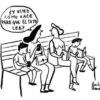How many times have we heard or said this. It is one of the most typical phrases among mothers, isn’t it? But… How many things do we know about vitamins and how many of them are true?
We review the main myths about vitamins. Learn how to banish them and incorporate vitamins correctly in your child’s diet.

1. It is necessary to drink the juice quickly, because the vitamins are lost. This is not true. Vitamins can keep all their properties for up to 12 hours. The only thing that changes is the taste.
2. Against colds, take vitamin C. For a long time it was thought that the best thing to ‘cut’ a cold was the consumption of vitamin C. However, the latest studies refute this claim. Vitamin C does not prevent or protect against colds. However, its daily consumption can ‘soften’ the effects of a cold. But only that. The rest is a myth.
3. Pills provide all the necessary vitamins. This is not true. Vitamins provided by fruits and vegetables are irreplaceable. Pills are not always beneficial. It depends on each organism and situation.
4. Vitamins are fattening. This is not true. What happens is that they do not satiate, but on the contrary, they increase appetite.
5. Vitamins prevent cancer. There is still no study that has been able to prove this. Countless studies have been carried out with vitamin B, vitamin C and vitamin E. In none of these cases was it possible to reduce the risk of cancer by increasing vitamin intake.
6. If I give my child vitamins regularly, he doesn’t need to exercise as much. Vitamins are not a substitute for the beneficial effects of exercise. It’s the perfect excuse for the lazy ones.
7. There are vitamins that cause allergies. There is no scientific study that confirms this fact. In principle, no natural vitamin generates an allergy. However, vitamin supplements or ‘artificially’ obtained vitamins can cause allergic reactions.
8. If they are not taken in the morning, on an empty stomach, they are not effective. This is not true. Vitamins can be consumed at any time of the day. In fact, there are vitamins that are better assimilated accompanied by fatty foods (A, D, E, K).
9. Vitamins prevent heart attacks and heart problems. Another of the myths and beliefs that scientists have been unable to prove.
10. To take vitamin C, you have to take citrus fruits. Citrus fruits are not the only source of vitamin C. In fact, they only cover 75% of the daily requirement of this vitamin. Acerola or currants, red bell pepper or broccoli offer more vitamin C than oranges.
What we know about vitamins and it is true
There are 13 vitamins in total, some of which are dissolved in water and should be consumed daily, such as vitamin C or B vitamins. The excess of these vitamins is excreted in the urine. But there are other vitamins, the fat-soluble ones, which accumulate in the body, and an excess can cause problems. For example, vitamins A, D, E and K. Therefore, in the case of these vitamins, it is not necessary to consume them daily. Here are some other interesting facts about vitamins:
– Too many vitamins are not good. It is true. An excess of vitamins generates a vitamin overdose. The body does not have time to assimilate them all. For example, an excess of vitamin E contributes to cell aging.
– Vitamin D is best taken in pill form. It is true. Especially in countries where there are fewer hours of sunlight per day, doctors recommend giving children a vitamin D supplement in pill form, as the body does not get enough vitamin D from the sun and food.
– Beware of vitamins from ‘natural’ supplements. Just because vitamins come from plants does not mean they cannot be dangerous. Excess vitamins are harmful, whatever the source.
– There are ‘superfoods’ that provide us with a large amount of vitamins in a balanced way. For example, apples, asparagus, blueberries, broccoli, dark chocolate, quinoa or kale, among others.
– Vitamin C helps to burn fat. It is a good supplement for athletes and dieters.








